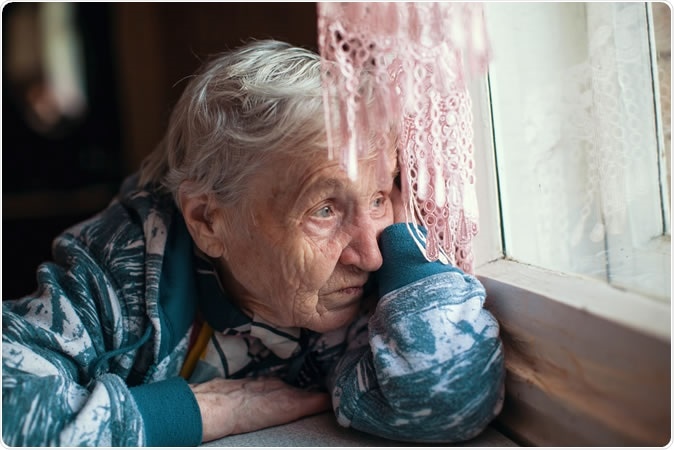In contrast to previous reports that the U.S. population has increasing rates of loneliness and isolation, a new report shows that it’s not entirely true, at least for baby boomers. Older people may not be any lonelier than their counterparts from previous generations, there are just more of them.

Image Credit: De Visu / Shutterstock
The two new studies, which were published in the American Psychological Association (APA) journal Psychology and Aging, shed light on the truth about the “loneliness epidemic”, which are reports of increased loneliness and social isolation among the U.S. population.
Both studies, which were conducted in the United States and the Netherlands, reached the same conclusion. People feel lonelier when they reach the age of 75 above. However, today's older adults are not feeling more isolated and lonelier than in previous generations. In the study conducted in the Netherlands, the researchers found that older adults may feel less lonely today due to increased self-confidence and they have more control over their lives.
“We found no evidence that older adults have become any lonelier than those of a similar age were a decade before,” Dr. Louise C. Hawkley of the NORC at the University of Chicago, said.
“However, average reported loneliness begins to increase beyond age 75, and therefore, the total number of older adults who are lonely may increase once the baby boomers reach their late 70s and 80s,” he added.
The U.S. Census Bureau reports that about 10,000 baby boomers turn 65 every day, a trend that is projected to remain until 2030.
Social isolation and loneliness
There had been misconceptions about what institutes loneliness. For instance, when an older adult has not been married, has not been involved in the community or higher rates of living alone can all pinpoint social isolation. But, being isolated doesn’t mean that people feel lonely.
"People can feel lonely even if surrounded by others, and people do not necessarily feel lonely even if they are alone," Hawkley explained.
The studies, however, don’t mean that there will be no loneliness epidemic in the future, as the baby boomer population will age and those in the younger generations today struggle with isolation and feelings of loneliness.
To arrive at their findings, the researchers utilized information and results from the Health and Retirement Study and the National Social Life, Health, and Aging Project, which were two national surveys of older adults. They compared three groups of adults born in different periods in the 20th century.
The team studied data from 2005 to 2006 from 3,005 adults who were born from 1920 to 1947, and in 2010 to 2011 from 3,377 adults, including those who are still living from the former study and their partners. They also analyzed data from 2015 to 2016 from 4,777 adults, which included those respondents from the previous two surveys and an additional sample of people born from 1948 to 1965.
The team also examined the respondents’ educational attainment, overall health, level of loneliness, number of family members or friends they are close to, and marital status. They found that loneliness lowered between the ages of 50 and 74, but soared after 75 years of age, but there was no difference in loneliness between baby boomers and similar-aged adults of earlier generations.
Older adults lonelier when they reach age 75
The findings also revealed that having better educational opportunities, improved health and widowhood later in life may decrease levels of loneliness in adults aged 50 to 74. Further, the increased loneliness in the age group of 75 and older may be attributed to losses that are common and prevalent in older age.
Since the population is aging, there will be an increase in the number of lonely older adults, which predisposes them to poor physical and cognitive health, early mortality, and depression. Also, during this age, they experience decreased mobility and independence. They experience becoming a caregiver or a widow and coping with the deaths and loss of friends and family members. All these factors trigger loneliness in older adults.
Keeping loneliness at bay
Loneliness can take a toll on one’s physical and psychological health. Loneliness in later life is caused by many factors like drifting social relationships, loss of a spouse or family members, and changing social trends. They will feel better if they maintain social relationships with others.
The researchers recommend they can benefit from volunteering to enhance self-esteem, life satisfaction, social support, and lower mortality rates. Aside from its good for the emotions, it’s also good for the health. It helps fight a sense of loss of purpose and a lack of cognitive stimulation. Helping others and getting involved like in activities in the church can help combat loneliness.
Journal references:
- “Are U.S. Older Adults Getting Lonelier? Age, Period and Cohort Differences,” by Louise C. Hawkley, PhD, NORC at the University of Chicago; Kristen Wroblewski, MS, L. Philip Schumm, MA, University of Chicago; Till Kaiser, PhD; and Maike Luhmann, PhD, Ruhr University Bochum. Psychology and Aging. Published Dec. 10, 2019. https://psycnet.apa.org/doiLanding?doi=10.1037%2Fpag0000365
- “Loneliness Declines Across Birth Cohorts: The Impact of Mastery and Self-Efficacy,” by Bianca Suanet, PhD, and Theo G. van Tilburg, PhD, Vrije Universiteit Amsterdam. Psychology and Aging. Published Dec. 10, 2019. https://psycnet.apa.org/doiLanding?doi=10.1037%2Fpag0000357